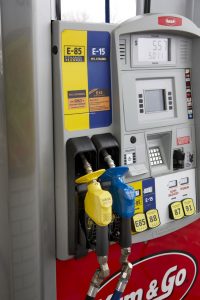Ethanol-blended fuels are saving Nebraska consumers money at the pump this year – nearly $17 million. According to data analyzed by the Nebraska Ethanol Board (NEB), these savings are due to lower-prices for ethanol as compared to wholesale gasoline along with the state’s projected yearly fuel consumption of 900 million gallons. Today the most common ethanol blend sold across the country is E10, or a blend of 10 percent ethanol and 90 percent gasoline. NEB reports that between August 2015 and August 2016 the wholesale cost of ethanol averaged 18 cents per gallon less than the minimum octane fuel legally allowed to be sold in the majority of the country.
In terms of national gas consumption, the Department of Energy (DOE) is projecting that national yearly fuel consumption will exceed 140 billion gallons in 2016. Thanks in part to state and federal biofuel programs, 97 percent of this fuel will be blended with ethanol, and NEB notes the cleaner-burning, octane boosting biofuel make it an indispensable component of the country’s motor fuel supply.
NEB Board Administrator Todd Sneller is anticipating that ethanol’s role in 2017 will grow due to increased biofuel volumes as required by the federal Renewable Fuel Standard (RFS). “Higher octane fuel reduces ‘engine knocking’ and provides better vehicle performance,” he said. “Adding ethanol to boost octane reduces the toxicity of gasoline. It’s a win-win for consumers and the environment.”
Adding ethanol to fuel blends increases octane so adding 10 percent ethanol to regular gasoline is sold as 87 octane, the minimum octane recommended by most automakers. Adding ethanol also reduces tailpipe emissions and thus helps to improve air quality. For example, EPA’s Urban Air Toxics report states that U.S. refiners often boost octane by adding refining by-products such as benzene, toluene, ethyl benzene and xylene. The majority of these chemicals are either known to be or suspected of being carcinogens. Plus they are more expensive than ethanol – on average petroleum-based additives range from 35 cents to a dollar more per gallon than ethanol according to a February 2016 study conducted by the University of Illinois at Urbana-Champaign.
“These products of oil refining, known as aromatics, can produce cancer-causing emissions which damage the human immune, respiratory, neurological, reproductive and developmental systems,” Sneller said. “Ethanol is much less expensive and cleaner-burning than these toxic petroleum-based chemicals.” He added, “Future growth in the ethanol industry is likely tied directly to automaker efforts to meet increasingly stringent U.S. fuel economy standards. New vehicles will have more efficient, higher compression engines that require even higher octane fuels. Ethanol will continue to play a role as a high-octane, low-carbon renewable choice in the U.S. and abroad.”


